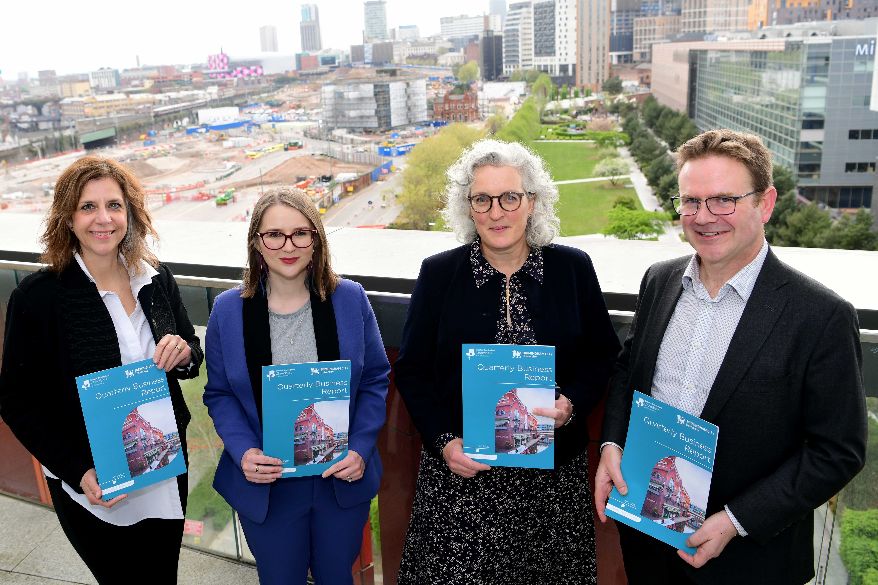Maximising on the ‘transformational initiatives’ taking place across Greater Birmingham will be key to putting the city and the business community on the map, according to a speaker at an event hosted by Greater Birmingham Chambers of Commerce last night, writes Claudia Congrave and Sophia Corness-Parr.
Business leaders gathered at Birmingham City University (BCU) to reflect on the performance of the Greater Birmingham business community in Q1, outlined in the Chamber’s Quarterly Business Report (QBR).
They were also joined by Ruth Todd, chief commercial officer at HS2, and David Grady, chief financial officer at Birmingham 2022 Commonwealth Games.
The event and report, sponsored by BCU, set the scene for the current business landscape in the West Midlands, which highlighted ongoing recruitment challenges and a slight drop in export sales, contrasting with strong domestic sales and robust business confidence.
Despite the evident challenges faced by businesses at present, Joanna Birch, director of innovation, enterprise, employability, and business engagement at BCU, embodied the undefeated optimism of local businesses when she stressed that collaboration is the best way to make the most of the once-in-a-lifetime opportunities presenting themselves across the region, particularly in the shape HS2 and the Birmingham 2022 Commonwealth Games.
Providing key updates on the progress of the high-speed railway line and its legacy for the future, Ruth Todd, chief commercial officer at HS2, explained that 90 per cent of enabling work is now complete as HS2 enters “it’s peak construction period”. Between London and Birmingham there are now over 340 active sites. 6,500 jobs have also been created from Birmingham to Crewe and over 900 apprentices have started working with HS2, all in a bid to leave the “legacy for a highly skilled workforce for the future”.
Ms Todd said: “We are working to attract diverse and underrepresented people; to support young, local and diverse groups. Some of the people I meet haven’t worked in this environment before and they are thriving. I feel very compelled by that.”
Despite the success of the project so far, Ruth noted that the HS2 project has not bypassed the nation-wide challenges of inflation and high shortages in steel have reinforced the need for a “resilient capable supply chain”.
Ms Todd added: “Before a single train starts running, we’re hoping Birmingham businesses are already seeing the benefits of HS2.” On the other end of the spectrum, David Grady explained that the investment in the Commonwealth Games is unlike buying into a physical entity, much like with HS2. Rather, he said that investing in the Games is like buying into an opportunity, one which businesses would regret missing out on.
Describing the economic legacy of the event, which will be the first carbon neutral games and global multi-sporting event, Mr Grady reminded businesses that the eyes of 2.5billion people will be on the city this summer, giving businesses across the region the chance to take centre stage. With a funding ratio of 3:1, a quarter of which is being invested by Birmingham City Council and three quarters from national government, he said that “any other city in the country would bite the government’s hand off” for the level of investment and attention that has been put into levelling-up the city in preparation for the Games.
Despite the obvious monetary benefits, especially in a time of wide economic uncertainty, Mr Grady was clear that money is not all that the event is about. He emphasised that a ‘big shop window’ will be created, thinking ahead to hotels across the city being home to global audiences, hospitality venues full of customers, and a huge focus on Birmingham as a bustling backdrop of the BBC’s coverage from Centenary Square.
All these components, he hopes, will leave a lasting impression of Birmingham on viewers, providing that businesses are ready to grab the rare opportunity by the horns.
